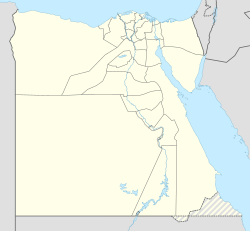Abu Hummus
Abu Hummus
أبو حمص | |
|---|---|
 Location in Beheira Governorate | |
| Coordinates: 31°06′02″N 30°18′46″E / 31.10056°N 30.31278°E | |
| Country | |
| Governorate | Beheira Governorate |
| Area | |
| • Total | 542.4 km2 (209.4 sq mi) |
| Population (2021)[1] | |
| • Total | 569,157 |
| • Density | 1,000/km2 (2,700/sq mi) |
| Time zone | UTC+2 (EET) |
| • Summer (DST) | UTC+3 (EEST) |
Abu Hummus, also Abu Humus, Abu Hommos, Abu Homos,[2] Abou Homs (Arabic: أبو حمص) is a town in Beheira Governorate, Egypt, an administrative center of markaz Abu Hummus.
The old name of the town is Shubra Bar (Arabic: شبرا بار) or Shunbar (Arabic: شُنْبَار)[3] which Ramzi derives from Chabriou Kome (Ancient Greek: Χαβρίου Κώμη) named after Chabrias.[4] Gauthier derives the modern name from Egyptian hap-m-s "which hides what is in it".[5]
Geography
[edit]
Located midway between the city of Alexandria and the western branch of the Nile Delta, south of Lake Adko, Abu Hummus spans between the Cairo-Alexandria Agricultural Road and the El-Mahmoudeya Canal.[6]
The town has a Local court, City Town Hall, and a railway station. In 1911 Nakhla meteorite landed in the town.[7][8][9] Many people witnessed the meteorite approaching from the northwest, inclination about 30°, along with the track marked with a column of white smoke. Several explosions were heard before it fell to Earth in an area of 4.5 kilometres (2.8 mi) in diameter, and about forty pieces were recovered;[10] the fragments were buried in the ground up to a metre deep.
Markaz
[edit]As of 2007[update], the population of the markaz Abu Hummus was estimated at 348,000.[2] The markaz is known as the site of the Nakhla meteorite.[7]
Notable people
[edit]References
[edit]- ^ a b "Abū Ḥummuṣ (Markaz, Egypt) - Population Statistics, Charts, Map and Location". citypopulation.de. Archived from the original on 16 March 2023. Retrieved 16 March 2023.
- ^ a b Ortega, O.Y.; The University of Iowa. Applied Mathematical & Computational Sciences (2008). Evaluation of Rotavirus Models with Coinfection and Vaccination. University of Iowa. p. 17. ISBN 9780549683223. Retrieved 2015-06-24.
- ^ "Papyrus information". www.apd.gwi.uni-muenchen.de. Retrieved 2024-04-17.
- ^ رمزي, محمد. القاموس الجغرافي للبلاد المصرية. p. 622.
- ^ Gauthier, Henri (1927). Dictionnaire des noms géographiques contenus dans les textes hiéroglyphiques. Vol. 4. p. 10.
- ^ "Abu Hummus" Archived 2012-04-03 at the Wayback Machine, a Durham University webpage
- ^ a b "the meteoric stones of El Nakhla El Baharia (Egypt)", by G.T.Prior, Keeper of Minerals in the British Museum; read November 14, 1911, Mineralogical Magazine, 1912, vol. 16, pp. 274–281
- ^ "The Nakhla Meteorite" – From NASA's Jet Propulsion Laboratory
- ^ "Nakhla meteorite fragment" – From the Natural History Museum. Rotatable image of a fragment of the meteorite. URL accessed September 6, 2006.
- ^ McBridge, Kathleen M.; Righter, K. (August 8, 2011). The 100th Anniversary of the Fall of Nakhla: The Subdivision of BM1913,25. 74th Annual Meeting of the Meteroritical Society. NASA Technical Reports Server. hdl:2060/20110014358.


